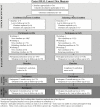Web-based versus in-person methods for training lay community health advisors to implement health promotion workshops: participant outcomes from a cluster-randomized trial
- PMID: 29955889
- PMCID: PMC7184874
- DOI: 10.1093/tbm/iby065
Web-based versus in-person methods for training lay community health advisors to implement health promotion workshops: participant outcomes from a cluster-randomized trial
Abstract
Project HEAL (Health through Early Awareness and Learning) is an implementation trial that compared two methods of training lay peer community health advisors (CHAs)-in-person ("Traditional") versus web-based ("Technology")-to conduct a series of three evidence-based cancer educational workshops in African American churches. This analysis reports on participant outcomes from Project HEAL. Fifteen churches were randomized to the two CHA training methods and the intervention impact was examined over 24 months. This study was conducted in Prince George's County, MD, and enrolled 375 church members age 40-75. Participants reported on knowledge and screening behaviors for breast, prostate, and colorectal cancer. Overall, cancer knowledge in all areas increased during the study period (p < .001). There were significant increases in digital rectal exam (p < .05), fecal occult blood test (p < .001), and colonoscopy (p < .01) at 24 months; however, this did not differ by study group. Mammography maintenance (56% overall) was evidenced by women reporting multiple mammograms within the study period. Participants attending all three workshops were more likely to report a fecal occult blood test or colonoscopy at 24 months (p < .05) than those who attended only one. These findings suggest that lay individuals can receive web-based training to successfully implement an evidence-based health promotion intervention that results in participant-level outcomes comparable with (a) people trained using the traditional classroom method and (b) previous efficacy trials. Findings have implications for resources and use of technology to increase widespread dissemination of evidence-based health promotion interventions through training lay persons in community settings.
Trial registration: ClinicalTrials.gov NCT02076958.
Keywords: African Americans; Cancer early detection; Community health advisors; Implementation; Web-based learning.
© Society of Behavioral Medicine 2018. All rights reserved. For permissions, please e-mail: journals.permissions@oup.com.
Figures

Similar articles
-
Adoption, reach, and implementation of a cancer education intervention in African American churches.Implement Sci. 2017 Mar 14;12(1):36. doi: 10.1186/s13012-017-0566-z. Implement Sci. 2017. PMID: 28292299 Free PMC article. Clinical Trial.
-
Dimensions of sustainability for a health communication intervention in African American churches: a multi-methods study.Implement Sci. 2017 Mar 28;12(1):43. doi: 10.1186/s13012-017-0576-x. Implement Sci. 2017. PMID: 28351405 Free PMC article. Clinical Trial.
-
Training Community Health Advisors in African American Churches: Do Training Outcomes Predict Performance?J Cancer Educ. 2020 Apr;35(2):395-402. doi: 10.1007/s13187-019-1478-1. J Cancer Educ. 2020. PMID: 30680648 Free PMC article.
-
The Save our Sisters Project. A social network strategy for reaching rural black women.Cancer. 1993 Aug 1;72(3 Suppl):1071-7. doi: 10.1002/1097-0142(19930801)72:3+<1071::aid-cncr2820721322>3.0.co;2-v. Cancer. 1993. PMID: 8334660 Review.
-
Peer Support as an Ideal Solution for Racial/Ethnic Disparities in Colorectal Cancer Screening: Evidence from a Systematic Review and Meta-analysis.Dis Colon Rectum. 2020 Jun;63(6):850-858. doi: 10.1097/DCR.0000000000001611. Dis Colon Rectum. 2020. PMID: 32167969
Cited by
-
Cancer interventions with faith-based organizations: a scoping review.Cancer Causes Control. 2025 Aug;36(8):765-779. doi: 10.1007/s10552-025-01977-6. Epub 2025 Mar 4. Cancer Causes Control. 2025. PMID: 40038170
-
Prior health promotion experience and intervention outcomes in a lay health advisor intervention.Health Educ Res. 2022 Aug 1;37(4):266-277. doi: 10.1093/her/cyac015. Health Educ Res. 2022. PMID: 35726480 Free PMC article.
-
The role of community health advisors' cancer history in implementation and efficacy of a cancer control intervention.Health Educ Res. 2023 Jul 25;38(4):350-361. doi: 10.1093/her/cyad011. Health Educ Res. 2023. PMID: 36892605 Free PMC article. Clinical Trial.
-
An Integrative Review on the Feasibility and Acceptability of Delivering an Online Training and Mentoring Module to Volunteers Working in Community Organizations.Front Digit Health. 2021 Oct 14;3:688982. doi: 10.3389/fdgth.2021.688982. eCollection 2021. Front Digit Health. 2021. PMID: 34723241 Free PMC article. Review.
-
Expanding Implementation Research to Prevent Chronic Diseases in Community Settings.Annu Rev Public Health. 2021 Apr 1;42:135-158. doi: 10.1146/annurev-publhealth-090419-102547. Epub 2021 Jan 19. Annu Rev Public Health. 2021. PMID: 33467924 Free PMC article. Review.
References
-
- Brownson RC, Colditz GA, Proctor EK.. Dissemination and Implementation Research in Health: Translating Science to Practice. Oxford, New York: Oxford University Press; 2012.
-
- Kerner JF. Integrating research, practice, and policy: what we see depends on where we stand. J Public Health Manag Pract. 2008;14(2):193–198. - PubMed
-
- Kerner JF, Guirguis-Blake J, Hennessy KD, et al. . Translating research into improved outcomes in comprehensive cancer control. Cancer Causes Control. 2005;16(suppl 1):27–40. - PubMed
-
- Campbell MK, Hudson MA, Resnicow K, Blakeney N, Paxton A, Baskin M. Church-based health promotion interventions: evidence and lessons learned. Annu Rev Public Health. 2007;28:213–234. - PubMed
Publication types
MeSH terms
Associated data
Grants and funding
LinkOut - more resources
Full Text Sources
Other Literature Sources
Medical

